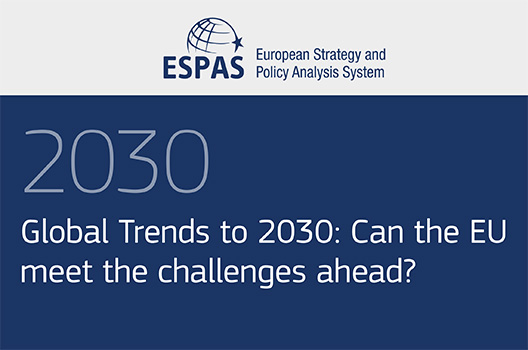 On Thursday, July 23, the Atlantic Council hosted colleagues from the European Strategy and Policy Analysis System (ESPAS) for “Mapping Global Trends: A Transatlantic Discussion,” an event that included European and American government thought leaders in strategic foresight. The meeting began with a review of the latest ESPAS Report, Global Trends to 2030: Can the EU ? Meet the Challenges Ahead?, and moved into a larger conversation on how to implement the findings from foresight research.
On Thursday, July 23, the Atlantic Council hosted colleagues from the European Strategy and Policy Analysis System (ESPAS) for “Mapping Global Trends: A Transatlantic Discussion,” an event that included European and American government thought leaders in strategic foresight. The meeting began with a review of the latest ESPAS Report, Global Trends to 2030: Can the EU ? Meet the Challenges Ahead?, and moved into a larger conversation on how to implement the findings from foresight research.
The report identified five key global trends that will shape our world as 2030 approaches:
- A richer and older human race characterized by an expanding global middle class and greater social and economic inequalities;
- A more vulnerable process of globalization led by an “economic G3”;
- A transformative industrial and technological revolution;
- A growing nexus of climate change, energy, and competition for resources;
- Changing power, interdependence, and fragile multilateralism.
The report also identifies three global revolutions that will pose subsequent challenges for Europe:
- The global economic and technological revolution
- Reshaping the economy
- Moving towards a society of change and innovation
- The global social and democratic revolution
- Dealing with inequalities
- Restoring trust in democracy
- The global geo-political revolution
- Enhancing the international role of the European Union (EU)
In order to address the above trends and revolutions, economic catch-up and a more effective working relationship between global players are necessary. The future of the EU depends on strong leadership and sound strategic thinking. Foresight is a major component of determining the avenues that the EU can take to address these issues.
In the United States, Global Trends 2030: Alternative Worlds and the practice of foresight inform strategy development and doctrine. By focusing on key trends and uncertainties, especially those with more regional consequences, the intelligence community has been able to develop potential short- and long-term scenarios that are based on patterns and uncertainties.
With this in mind, it is critical for foresight analysts to expand their horizons and observe foresight research conducted beyond the transatlantic community. Participants agreed that, as power becomes more diffuse and as the transatlantic community once again looks to reinvigorate intergovernmental organizations, foresight analysis from China and elsewhere are critical to informing long-term policy thinking.

